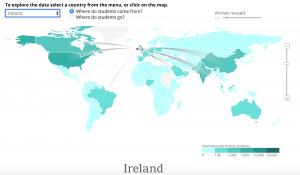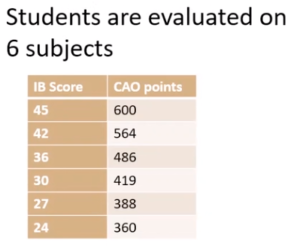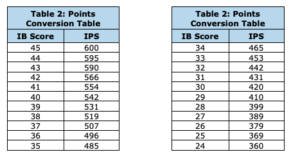Ireland
Irish University Key Facts and Unique Aspects
- Searchable database for studying in the Republic of Ireland.
- Nine Universities and 11 Institutes of Technology
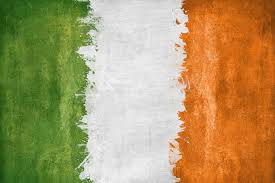
- Direct Entry into your major:
- Not sure what you want to study? Try this tool which allows you to enter you primary courses (it is designed for A-Levels, but you can put in your three Higher Levels for IB or Advanced Placement courses).
- Looking for a deeper exploration of career possibilities? Career Explorer offers one of the most comprehensive and interesting set of reports after answer questions for about 30 Minutes. And it is completely free.
- Application: Use the Central Application Office to apply online.
- Apply up to 10 programs–must put in rank order.
- Decisions based on final results in August.
- You will only receive one offer, so do rank order them.
- Entry Qualifications
- Competitive programs require specific CAO points
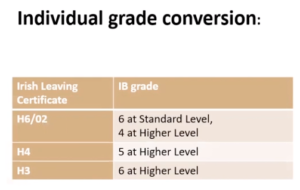
- Learn more here on page 95 onwards. You will find other conversions in the guide.
- US High School diploma: Minimum matriculation is award of High School Diploma. To attain a score over 400 applicants must present additional examinations. SAT, ACT, Advanced Placement (AP), International Baccalaureate standalone subjects and third level can be taken into account. Generally, to attain scores in excess AP/IB or third level is required.
- Download NACAC’s Guide to Applying to Ireland
- Note: Fees are based upon both on passport and physically living circumstances
- Europeans (EU/EEA/Swiss–living 3 to 5 years in Europe): “free fees” –€ 3000/ year
- Non EU Passports living in the EU: “EU Fees” — € 5,681 – €13,000/ year
- International (everyone else): € 5,681 – €13,000/ year –this may well include Europeans living outside of the Europe.
- Four year Single honor degree; 1 year masters; could also do a joint honors degree.
- Common entry mimics US style liberal arts.
- Several Engineering programs offer this options: The common engineering honours entry scheme is a one year programme for students interested in engineering as a career, but who may be unsure of which discipline to follow. The scheme gives students the opportunity to see all five engineering disciplines first hand.
- Trinity College Dublin does the same in social scienes and humanities: In Common Entry courses, you will study multiple subjects in first year and will then be able to choose either 1, 2 or 3 of these subjects to study in second year. After second year you will decide if you would like to specialise in one of these subjects to
achieve a Single Honours award or study two of these subjects to graduate either with a Joint Honours or a Major with Minor award. Common Entry courses include Business, Economics and Social Studies (B.E.S.S.); Philosophy, Political Science, Economics and Sociology (P.P.E.S.); or Classics, Ancient History and Archaeology
- Trinity College Dublin offers a dual degree with Columbia University in 9 Subject areas.
Cool Country facts
- Purchasing power: 82.3 –Consider the US as 100; a score of 80 means it is 20% less expensive than living in the USA
- Happiness Index Rank: 16 in the world!
- Quality of life: 154 (average is 140 across the globe)
- Rainbow Index: 53% LGBTI equality & human rights (average is 68 in Europe)
- US NEWS Best Countries: Rank 23
- Prosperity Index: 11th in the world.
- Learn more through Beyond the States Profile and Educations’ Country Guide
Application Process
- How to apply based on citizenship
- EU: Apply via CAO –cost 45 Euro
- Rank order your programs
- Decisions are based on final results
- Non EU: Direct application
- For Veterinary science use VMCAS
- For medicine: See Atlantic Bridge for details and applications
Application timeline:
- When to do what by
- Register by February 1 with CAO
Tuition fees:
- Average Tuition fees (in US Dollars/year):
- Citizens: $4963
- International students: $17,498
- Examples for international students
- Trinity College Dublin arts/humanities: €19,426
- Trinity College Dublin Business: €25,436
- Trinity College Dublin Engineering:$54,430
Research Links
- CareersPortal is useful to find out not only which universities offer which degrees in Ireland, but also career self assessment and really nice brief profiles of all Higher Education opportunities.
- Similarly, Qualifax offers a searchable database and Interest inventories
Unique aspects
There are 9 universities in Ireland.
- Dublin City University
- National University of Ireland, Galway
- Maynooth University
- Trinity College Dublin
- The University of Limerick
- University College Dublin
- University College Cork
- Technological University Dublin
- Royal College of Surgeons
There are 14 institutes of technology located around the country:-
- Athlone Institute of Technology
- Blanchardstown *
- Institute of Technology, Carlow
- Cork Institute of Technology
- Dublin *
- Dundalk Institute of Technology
- Dun Laoghaire Institute of Art, Design and Technology
- Galway-Mayo Institute of Technology
- Letterkenny Institute of Technology
- Limerick Institute of Technology
- Institute of Technology, Sligo
- Tallaght *
- Institute of Technology, Tralee
- Waterford Institute of Technology
**part of Technological University Dublin
Resources
Webinar with David Hawkins: Why should international students consider Irish universities?
Podcast with David Hawkins, The University Guy
CIALFO Webinar to study in Ireland
Study in Ireland, the Silicon Valley of Europe from Cialfo on Vimeo.
Check out UNESCO’s interactive map
